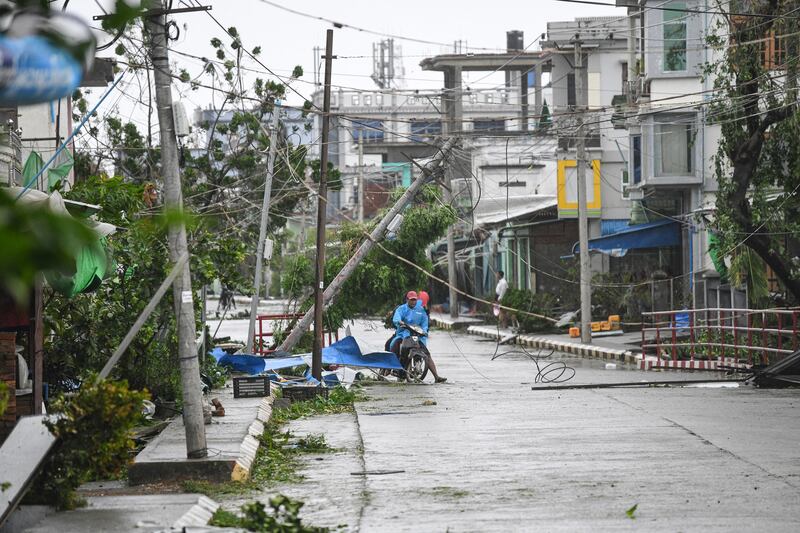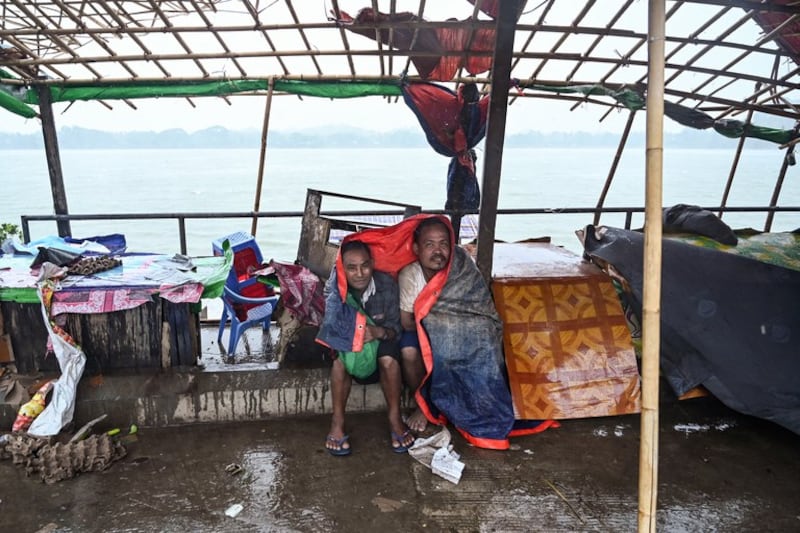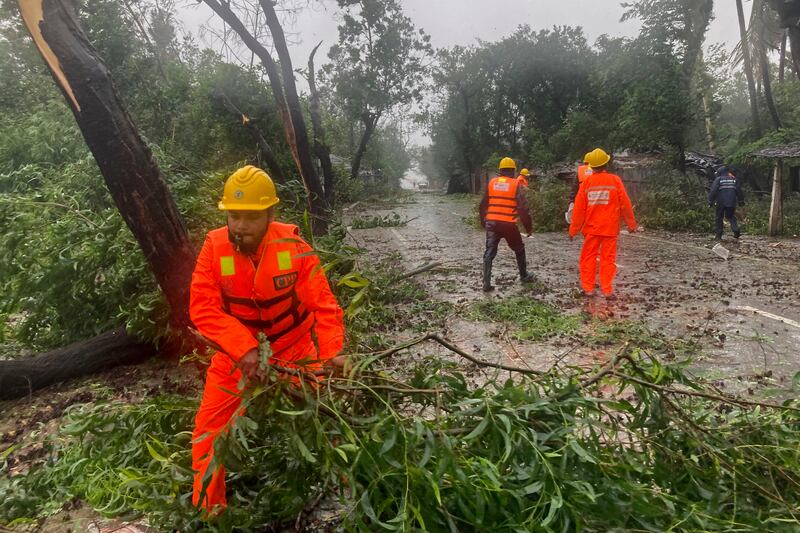Updated at 3:09 p.m. ET on 2023-05-14
Powerful Cyclone Mocha made landfall in western Myanmar’s Rakhine state on Sunday, causing deaths and bringing down trees, residents said, as humanitarian agencies warned of a severe impact on “hundreds of thousands of vulnerable people.”
The cyclone earlier on Sunday had intensified to a Category Five storm, with wind speeds reaching as high as 220 kilometers per hour (137 miles per hour), according to the Myanmar Department of Meteorology and Hydrology.
At least six people in Myanmar were reported to have died in the storm. No injuries were immediately reported in nearby southeastern Bangladesh, where about a million Rohingya refugees are sheltering in camps. The storm, however, caused damage and downed trees in Teknaf, a sub-district along the Burmese border, officials said.

Reuters reported that parts of Sittwe, the capital of Rakhine state, were flooded. A video posted on social media showed the ground floors of several buildings under water, according to the news service.
“The whole northern Rakhine has suffered severe damage,” said Khine Thu Kha, spokesperson for the Arakan Army, an ethnic Rakhine rebel group. “People are in trouble.”
The United Nations and its humanitarian partners spent the last week preparing for a “scaled-up cyclone response” by pre-positioning supplies and personnel.
The U.N.’s Office for the Coordination of Humanitarian Affairs (OCHA) said in a statement Sunday that “with the cyclone now losing intensity and moving inland, humanitarian teams” would start responding to those in need on Monday.
“The ongoing wild weather in Rakhine and telecommunications interruptions mean it has not yet been possible to assess the full magnitude of the disaster,” OCHA said. “But early reports suggest the damage is extensive and needs among already vulnerable communities, particularly displaced people, will be high.”
Before the cyclone, the U.N. had estimated that six million people were “already in humanitarian need” in western Myanmar’s Rakhine state, and the regions of Chin, Magway and Sagaing.
“Collectively, these states in the country’s west host 1.2 million displaced people, many of whom are fleeing conflict and are living in the open without proper shelter,” said OCHA, warning of “a nightmare scenario.”
Earlier fears that the cyclone might directly hit Cox’s Bazar in Bangladesh – home to Rohingya who live in crowded, low-lying camps – did not materialize, according to a correspondent for BenarNews.
The cyclone made landfall at around 3 p.m. and moved on from the area after 5 p.m. In Bangladesh, Mocha missed Cox’s Bazar city but hit the sub-district and town of Teknaf, refugee camps in Teknaf and Saint Martin’s Island in the Bay of Bengal, damaging houses and uprooting trees, the correspondent reported.
About 2,000 houses were destroyed – including 1,200 houses on Saint Martin’s island – and there was damage to 10,000 other homes, according to Muhammad Shaheen Imran, the head of Cox’s Bazar district civil administration.
There were no reports of landslides in Teknaf, as feared by authorities.
“Thank God, we have been saved,” Bangladesh’s Minister for Disaster Management and Relief Md. Enamur Rahman told BenarNews. “We feared for huge damage, but we have yet to get reports of major damage.”
Saint Martin’s island resident Halim Ali told BenarNews that his house was flattened and his belongings were washed away.
“Saint Martin’s is a devasted place: houses destroyed, trees uprooted,” he said.

Roxy Mathew Koll, a climate scientist at the Indian Institute of Tropical Meteorology in Pune, said Mocha was one of the biggest storms that ever occurred in the Bay of Bengal.
“It is stronger than Nargis,” Koll told Radio Free Asia, referring to the cyclone that left nearly 140,000 people dead and missing in 2008.
Cyclone Mocha formed on Thursday, causing heavy rains and a coastal surge in Rakhine state starting on Friday.
“Cyclone frequency is more or less the same in the Bay of Bengal – but once they form, they are intensifying quickly,” the scientist said. “This is in response to warmer oceans under climate change.”
Killed by falling trees
Mocha was weakening Sunday evening and moving toward Myanmar’s northwest. It was expected to become a depression by Monday when it’s over the Sagaing region, and will eventually move toward Kachin state.
Heavy rainfall and winds were expected as it moves into areas prone to flooding and landslides, according to the U.N.
In Tachileik city in northeastern Shan state, a married couple were buried in their house in a landslide caused by heavy rains on Sunday morning, according to the Hla Moe Tachilek Social Assistance Association.
Two people in Rakhine state, one man in the Irrawaddy region and another man in the Mandalay region were killed by falling trees.

In Sittwe, Rakhine state’s capital, a telecom tower collapsed under high winds and mobile phone signals are down. Residents have been sharing images of damaged houses and roads on social media.
The winds were still ravaging Sittwe as of Sunday afternoon and local authorities warned its 150,000 inhabitants to stay indoors.
Hundreds of Sittwe’s residents were already evacuated to the inland town of Mrauk-U on Saturday.
The Arakan Army, an ethnic Rakhine rebel group, said more than 10,000 people had been relocated from 21 villages on the coast and in low-lying areas in the state since Thursday.
Reported by Abdur Rahman in Cox's Bazar and Kamran Reza Chowdhury in Dhaka for BenarNews, and by RFA staff. Radio Free Asia is a Benar-News affiliated news service.
